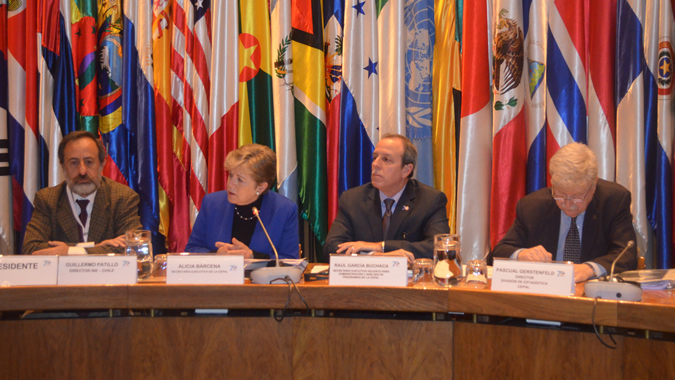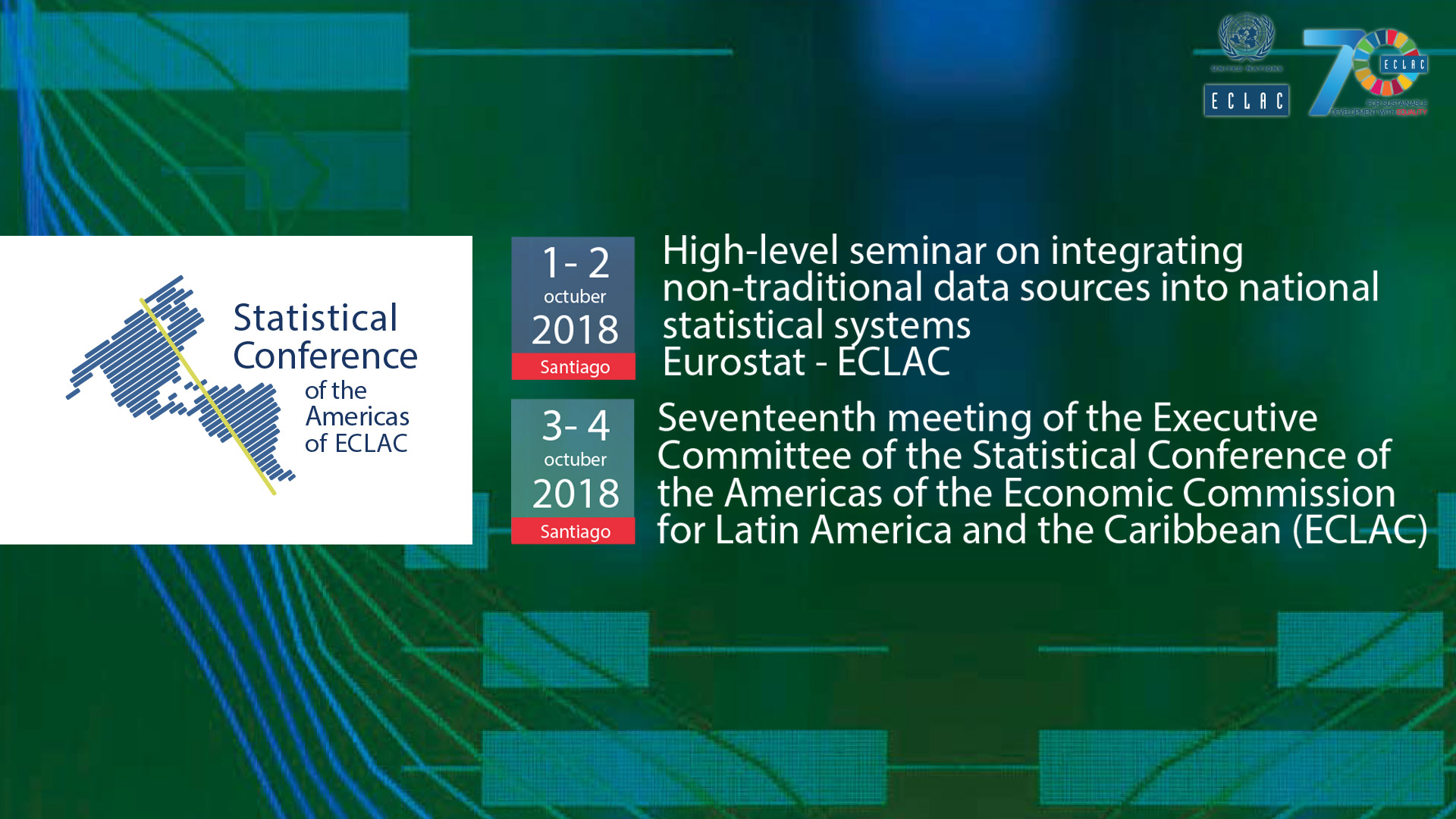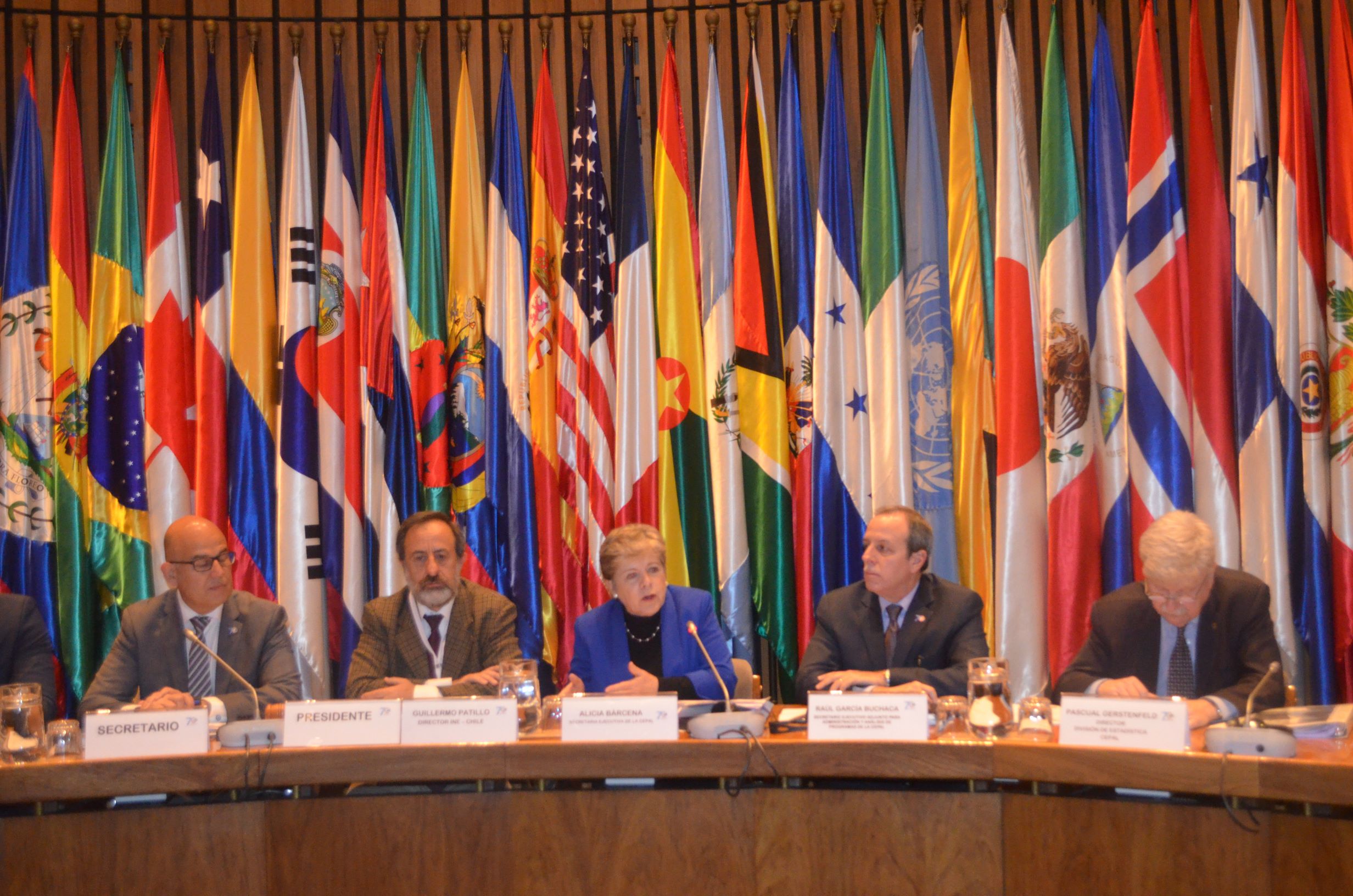Countries of Latin America and the Caribbean Evaluate at ECLAC the Set of Indicators Prioritized for Regional Follow-up to SDGs
Work area(s)
Alicia Bárcena, Executive Secretary of the UN regional organization, and Guillermo Pattillo, Director of the National Statistical Institute of Chile, inaugurated the Seventeenth meeting of the Executive Committee of the Statistical Conference of the Americas, which is being held through Thursday in Santiago, Chile.

Representatives from national statistics offices and National Statistical Systems in the region are participating this Wednesday and Thursday, October 3-4, in the Seventeenth Meeting of the Executive Committee of the Statistical Conference of the Americas (SCA), at the headquarters of the Economic Commission for Latin America and the Caribbean (ECLAC) in Santiago, Chile, where they will examine the set of indicators prioritized thus far for regional statistical follow-up to the 2030 Agenda’s Sustainable Development Goals (SDGs).
The meeting was inaugurated today by Alicia Bárcena, ECLAC’s Executive Secretary; Guillermo Pattillo, Director of the National Statistical Institute (INE) of Chile, in his capacity as President of the Executive Committee of the SCA; and Pascual Gerstenfeld, Chief of ECLAC’s Statistics Division.
During her remarks, Bárcena indicated that 2019 will be a critical year for national statistical institutes, since the first five-year period of implementation of the 2030 Agenda for Sustainable Development and its 17 SDGs will be evaluated, with global events scheduled for July and September.
The senior official highlighted the fact that at the meeting in Santiago, the SCA’s Statistical Coordination Group for the 2030 Agenda is presenting the results of the process of prioritizing indicators for the development of a regional statistical framework for follow-up to the SDGs. “ECLAC, as the Technical Secretariat, wants to continue accompanying this process,” she sustained.
The SCA, Bárcena indicated, has actively participated in the global mechanisms that seek to define the methodological aspects of the SDG indicators and close the gaps in statistical production. These include the Inter-agency and Expert Group on SDG Indicators as well as the High-level Group for Partnership, Coordination and Capacity-Building for Statistics for the 2030 Agenda for Sustainable Development.
Despite this progress, she stated, “the region still faces the challenge of attaining more and better statistics and greater levels of disaggregation, especially with regard to gender,” in addition to achieving an adequate link between official statistics and big data.
Meanwhile, the Director of the National Statistical Institute of Chile, Guillermo Pattillo, underscored that the meeting of the SCA’s Executive Committee has the goal of reviewing progress and pending challenges. “One of these is the real generation of open data. These days, open data are the standard that our institutes must attain,” he contended.
Pattillo also sustained that national statistics offices have the mission of “producing data that have true meaning for society, that are important for decision-making, data that are socially useful.”
Finally, Pascual Gerstenfeld, Chief of ECLAC’s Statistics Division, highlighted that “we are at a historic and privileged moment in time,” moving from “the production of indicators for accountability toward the increasing production of indicators that allow us to better design evidence-based public policies.”
“The 2030 Agenda and the SDGs are not merely a global statistical program; it is a program that has a political agenda for cooperation” to change the current development model, Gerstenfeld stressed.
Along with Chile in the Presidency, the Executive Committee of the SCA for the 2017-2018 period is made up of Canada, Costa Rica, Italy, Jamaica, Mexico and Peru, in accordance with what was agreed at the Ninth Meeting of the Statistical Conference of the Americas, held in the city of Aguascalientes, Mexico in November 2017.
The Statistical Conference of the Americas is a subsidiary body of ECLAC and the main forum for discussing the development of statistics in the region. Its main objectives are to promote the development and improvement of national statistics and their international comparability, along with international, regional and bilateral cooperation among national offices and international and regional agencies.
Related content

Countries of the Region Will Analyze the Statistical Framework for Follow-up to the 2030 Agenda
The Executive Committee of the Statistical Conference of the Americas of ECLAC will hold its seventeenth meeting on October 3-4 at ECLAC’s headquarters in Santiago, Chile.

Seventeenth meeting of the Executive Committee of the Statistical Conference of the Americas of ECLAC
This seventeenth meeting of the Executive Committee of the Statistical Conference of the Americas was held on October 3-4, 2018. The Report and Agreements of the meeting are available on this page.
Subregional headquarter(s) and office(s)
Country(ies)
- Latin America and the Caribbean
Contact
Public Information Unit
- prensa@cepal.org
- (56 2) 2210 2040
